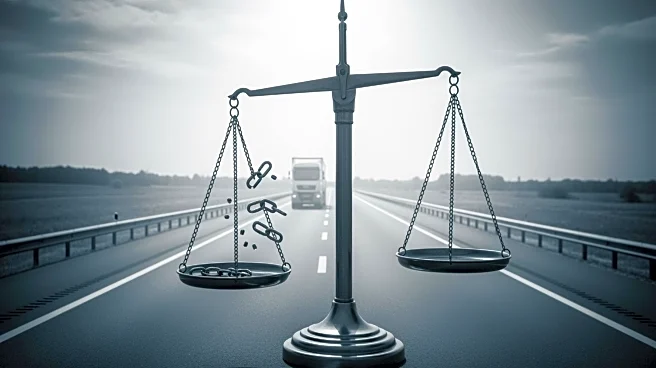What's Happening?
A growing trend of aggressive legal actions by plaintiffs' attorneys is significantly impacting the U.S. trucking industry and, by extension, the broader economy. These attorneys are accused of exploiting
the legal system by filing exaggerated or fabricated claims against truckers and transportation firms. This practice, often referred to as 'jackpot justice,' results in substantial financial burdens on American families, as the costs of these lawsuits are passed down through increased prices on goods and services. In 2022, tort costs in the U.S. reached $529 billion, representing 2.1% of the GDP, and are projected to rise to $900 billion by 2030 if current trends continue. The trucking industry, which is responsible for moving over 70% of domestic freight, is particularly vulnerable, with nuclear verdicts—awards exceeding $10 million—threatening the livelihoods of the 8.4 million Americans employed in the sector.
Why It's Important?
The aggressive legal tactics employed by some plaintiffs' attorneys have far-reaching implications for the U.S. economy. The trucking industry, a critical component of the supply chain, is under threat from these legal actions, which can lead to increased costs for consumers and potential job losses. Small trucking firms, which make up over 90% of the industry, are especially at risk, as they may be forced out of business by exorbitant legal awards. This situation not only affects the trucking industry but also has a ripple effect on the entire economy, as increased transportation costs lead to higher prices for goods and services. The need for legislative reform is urgent to protect the industry and ensure that the legal system is not exploited for financial gain at the expense of economic stability.
What's Next?
There is a growing call for legislative reform to address the issue of 'jackpot justice' and its impact on the trucking industry. Proposed measures include capping non-economic damages, increasing transparency in litigation funding, and granting federal courts jurisdiction over large cases to prevent forum shopping. The FAIR Trucking Act is one such legislative proposal aimed at curbing these practices. If enacted, these reforms could help restore balance to the legal system, protect the trucking industry, and ultimately reduce costs for consumers. However, the path to reform may face resistance from powerful interests that benefit from the current system.
Beyond the Headlines
The ethical implications of the current legal practices are significant, as they raise questions about the integrity of the justice system and the role of financial interests in litigation. The involvement of third-party financiers in lawsuits, who stand to profit from large settlements, further complicates the issue. This practice, while legal, is seen as unethical by many and highlights the need for greater oversight and regulation. The situation also underscores the importance of ensuring that the legal system serves the interests of justice rather than profit, and that it supports rather than undermines key industries like trucking.









